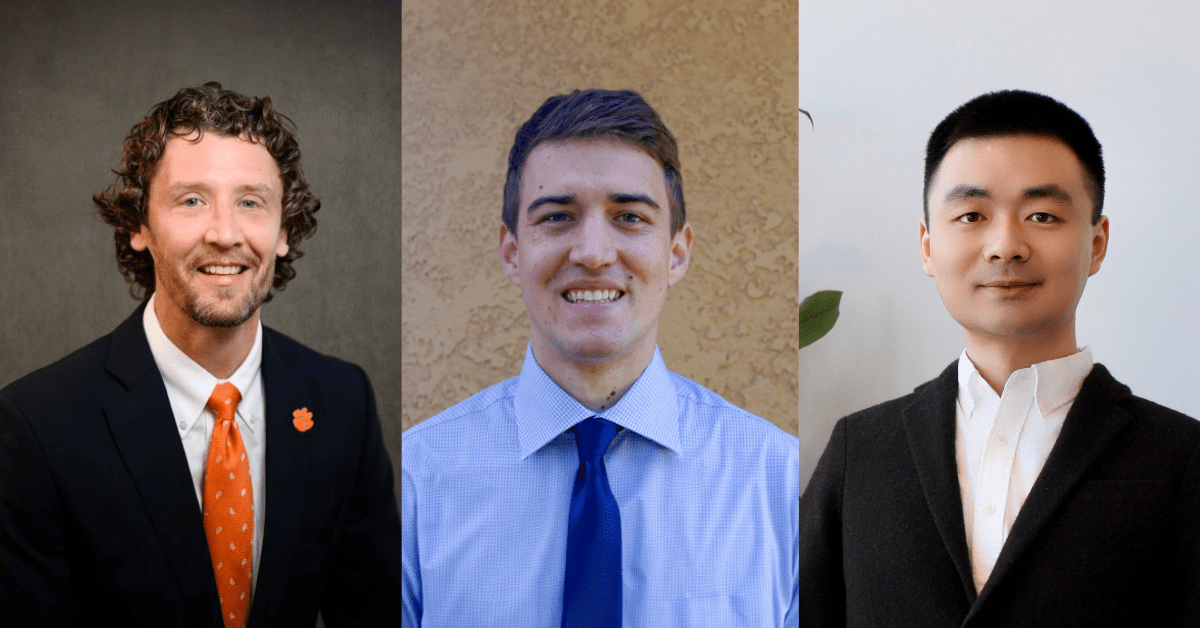The Wilbur O. and Ann Powers College of Business named three business faculty members Emerging Fellows beginning the 2024/2025 academic year. Emerging Fellows exhibited a record of distinctive pre-tenure achievement in research and either teaching or service.
“These Emerging Fellows have demonstrated what it means to be a well-rounded junior faculty member, publishing high quality research and also excellence in other aspects of their faculty roles. They are foundational to the future of the Powers College of Business and we are proud to recognize them for their accomplishments.”
Jennifer Siemens, Associate Dean for Faculty Excellence
Brian Goodson, associate professor, School of Accountancy
Goodson’s research involves the unintended consequences of accounting and financial regulations. In a recent co-authored study published in Contemporary Accounting Research, Goodson examined how a recent mandate for auditors to disclose the length of their tenure with audit clients affects investors’ decisions about those clients. Findings from this study show that mandatory tenure reporting leads investors to make sub-optimal investment decisions because they overemphasize tenure information in their judgments relative to objectively relevant financial metrics. Most recently, he has been working on a study that examines how social bonds between audit engagement partners can bias the partners’ evaluations of their client’s financial statements and how this bias manifests differently when the audit engagement is facing regulatory inspection. The goal of this study is to highlight how regulatory requirements related to audit partners’ review of each other’s work can reduce rather than enhance audit quality.
Jonathan Leganza, assistant professor, John E. Walker Department of Economics
Leganza’s research focuses on public, labor and health economics, specifically how individuals respond to government policies. His primary work examines social security and retirement policies, including how changes in eligibility ages affect labor market participation, and he also has research interests in how physicians respond to healthcare policies. In a recent co-authored study published in the American Economic Journal: Economic Policy, Leganza and his colleague analyzed a Danish reform that increased pension eligibility ages, finding that people who delayed their retirements experienced increased earnings and retirement savings. Furthermore, their study showed that people who continued to contribute to their employer-sponsored savings account accounted for a great deal of the increase in retirement savings.
He Li, assistant professor, Department of Management
Li has research interests in strategic IT decisions, including cybersecurity, digital platform ecosystems and how digital platforms disrupt the trucking freight industry. Most recently, his research has focused on strategic decisions in cybersecurity investments. This research area is particularly challenging because although cybersecurity breaches occur more frequently now, many firms do not have first-hand internal experiences of cybersecurity breaches to learn from. Additionally, the effectiveness of cybersecurity investments is often shown by the lack of breaches, which is hard to measure. Over the past decade, Li has been working on a longitudinal co-authored study on US hospitals, revealing that hospitals learn from peers within the same healthcare referral region when implementing cybersecurity systems. This effect is most noticeable in firms with stable IT leadership and strong inter-organizational connections.
To learn more about Powers College of Business research, visit our Research Highlights page.







